Knowledge Forum: Historical Overview and Future Perspectives of Japan’s Development Cooperation (70th Anniversary of Japan’s ODA)
2025.02.06
The year 2024 marks the 70th anniversary of Japan’s official development assistance (ODA) to developing countries. To celebrate this, on Oct. 21, 2024, the JICA Ogata Sadako Research Institute for Peace and Development (JICA Ogata Research Institute) held the Knowledge Forum “Historical Overview and Future Perspectives of Japan’s Development Cooperation.”
In the opening remarks, quoting the definition of history made by the historian E.H. Carr, “an unending dialogue between the present and the past,” President Tanaka Akihiko of JICA emphasized the importance of unraveling history. He reflected on the history of Japanese development cooperation, saying that its emphasis on self-reliance and human capacity building in partner countries led to Japan gaining trust from many other countries, forming the foundation of Japan’s global influence.
Tanaka then shared that in the revised Development Cooperation Charter of 2023, human security—a concept that aims to achieve a world where people are free from fear and want and can live with dignity—is regarded as a fundamental principle of Japanese development cooperation. He shared that co-creation, a concept which aims for various actors to create solutions together, is included as well. Tanaka remarked that in terms of listening closely to the voices of the people of developing countries and respecting their opinions, these concepts are an extension of the good traditions of Japanese international cooperation such as trust, self-reliance and human capacity building.
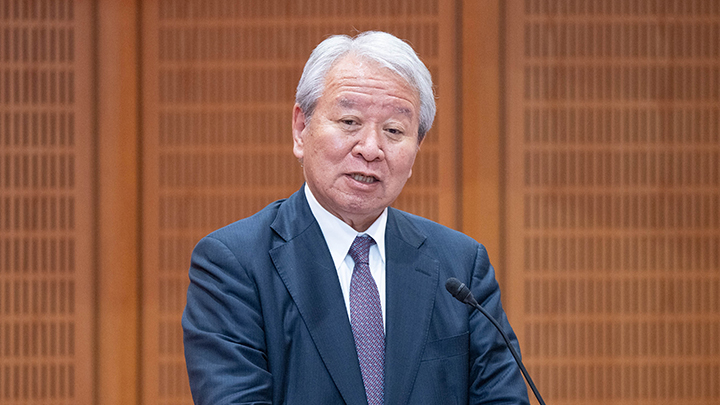
President Tanaka Akihiko, JICA, gives opening remarks.
Vice-President Kato Hiroshi of the International University of Japan (also a senior research advisor at the JICA Ogata Research Institute) gave a keynote speech. He analyzed the history and future of Japanese development cooperation with a focus on the national interest of Japan and international public interest.
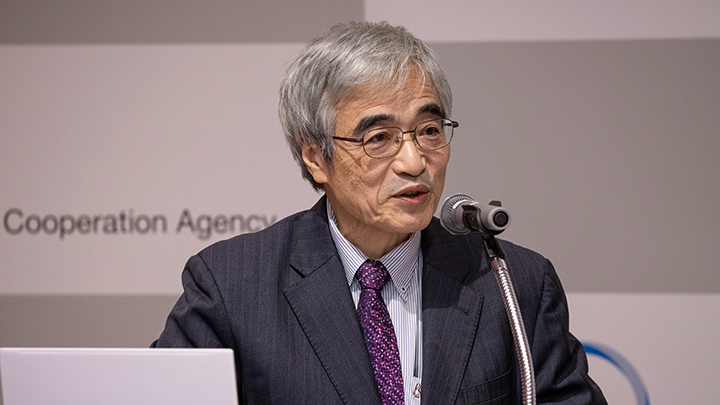
Vice-President Kato Hiroshi, International University of Japan, gives a keynote speech.
Kato started his speech by giving examples of the contribution of development cooperation to Japanese national interest: World War II (WWII) reparations; repairing relationships with Asian countries; facilitating high economic growth from the 1950s to the 1970s; securing resources and food in the 1970s; functioning as a means to make adjustments in the bilateral relationship with the United States following the trade conflict from the 1980s onward; fulfilling responsibilities as a developed country from the 1990s; and revitalizing the Japanese economy and society in the 2000s. He added that development cooperation has functioned effectively as an important diplomatic tool, creating opportunities for Japanese society to become more international, for Japanese human resources to branch out globally, and for improving global understanding of Japan. Kato concluded that development cooperation is an investment for the future. However, he pointed out that in order for Japanese taxpayers to recognize its significance, it is essential that those engaged in development assistance verify and account for the outcomes and effectiveness of development cooperation, and therefore historical studies are important.
Kato also noted that Japan’s significant contribution to the growth of Asia through development cooperation and private sector activities is itself a contribution to the international public interest. Japan’s strength, he noted, includes an aid model in which aid, investment, and trade go hand in hand, and aid strategies closely linked with specific policy implementation. Kato remarked that in a time when new frameworks like the post-2030 agenda are being discussed, Japan, with its experience, is capable of taking up a leadership position. He expressed high hopes for Japan to further explore effective models for development cooperation and deepen methodologies linked to policy implementation on the ground.
Next, Director General Miyahara Chie of the JICA Ogata Research Institute moderated a panel discussion. Authors of the book series “Reconsidering the History of Japan’s Development Cooperation,” which provides an overview of the outcome of the research project “Japan’s Development Cooperation: A Historical Perspective,” discussed how future development cooperation should look like from various perspectives with a development cooperation practitioner from JICA.
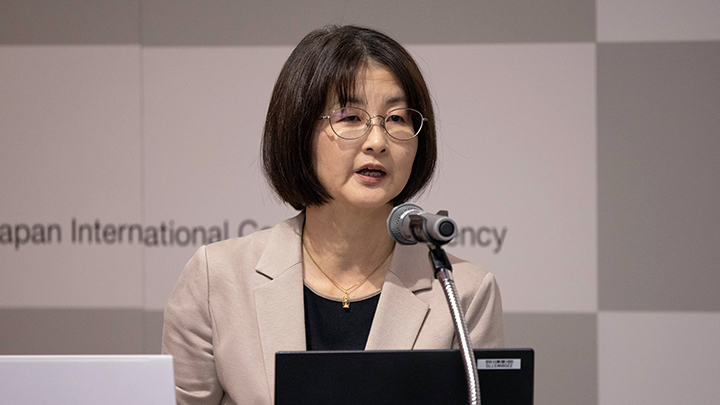
Director General Miyahara Chie, JICA Ogata Research Institute, moderates the session.
Professor Kuroda Kazuo, Waseda University (also a visiting fellow at the JICA Ogata Research Institute), is the author of
A History of Japan’s International Cooperation in Education: Principles, Policies, and Practices Crossing Borders
. He explained that by writing this book, he discovered that international cooperation in education by Japan has been a set of political activities for the improvement of diplomatic relationships and contribution to peace, influencing and being influenced by global governance. Kuroda recommended that future Japanese international cooperation should contribute to the establishment of global governance such as by setting an example for the global community and aim to become a provider of global public goods.
Professor Sato Jin, University of Tokyo (also a visiting fellow at the JICA Ogata Research Institute), is the author of
The Making of Development Cooperation: Ecological History of Dependency and Self-Reliance
. He conducted a follow-up investigation on “ controversial projects” from the 1980s and found that most of them were no longer seen as problematic. With this, Sato pointed out that perception, actual conditions and evaluation regarding development cooperation cases change with time. He argued that development cooperation used to be seen as part of post-WWII reconstruction and security policies, but now onward, it may need to be stimulated as part of a national movement through broader public support.
Executive Director Mine Yoichi of JICA Ogata Research Institute is the author of
Oral History of Development Cooperation: Beyond Crises.
He remarked that the use of oral history to reconstruct the history of Japanese development cooperation through narratives provided by local counterparts was largely successful and would like to continue this. He proposed that together with the book series “Project History,” this trial use of oral history may be applied in educational settings as learning tools. Mine then insisted that the accumulated experience of assistance for self-reliance should not be removed from the context of Japanese development cooperation.
From the perspective of a development cooperation practitioner, Iwama Nozomi, Senior Deputy Director General, Governance and Peacebuilding Department, JICA, pointed out the need to do the following: understand the background of the challenges and the history of the counterpart country; identify areas where national interests of Japan and the counterpart country overlap with international interest; intervene where official assistance is truly necessary; and work toward social innovation. Iwama also noted the importance of the following: leveraging the trust and network that JICA has cultivated as a development agency to collaborate more with partners that have not necessarily been directly working on development such as specialized agencies, civil society and foundations, and expand areas for new co-creation; and in parallel, based on the outcome of the research project “Japan’s Development Cooperation: A Historical Perspective,” making continuous efforts to build up trust.
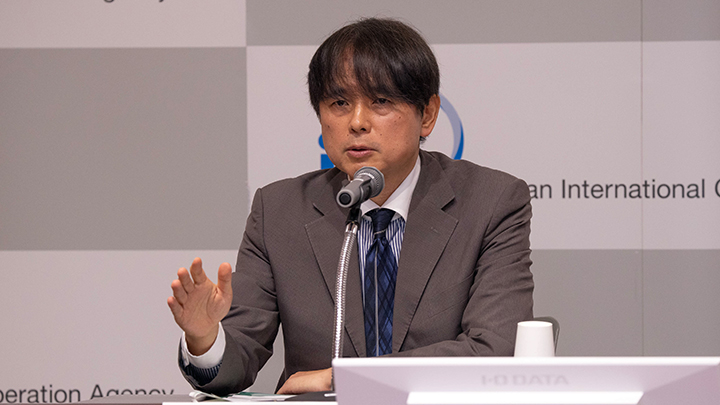
Kuroda Kazuo, Professor, Waseda University, is the author of A History of Japan’s International Cooperation in Education: Principles, Policies, and Practices Crossing Borders.
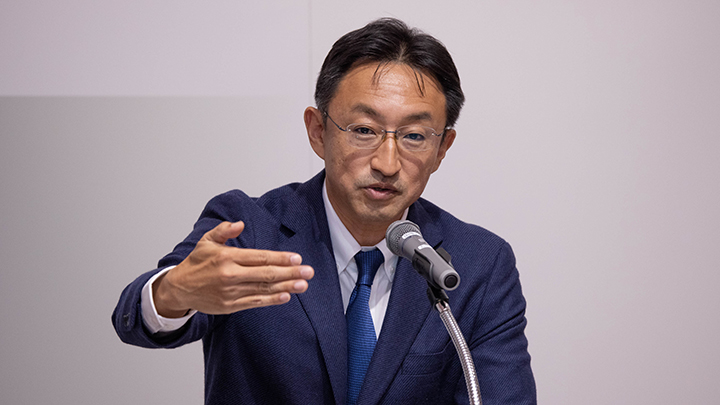
Sato Jin, Professor, University of Tokyo, is the author of The Making of Development Cooperation: Ecological History of Dependency and Self-Reliance.
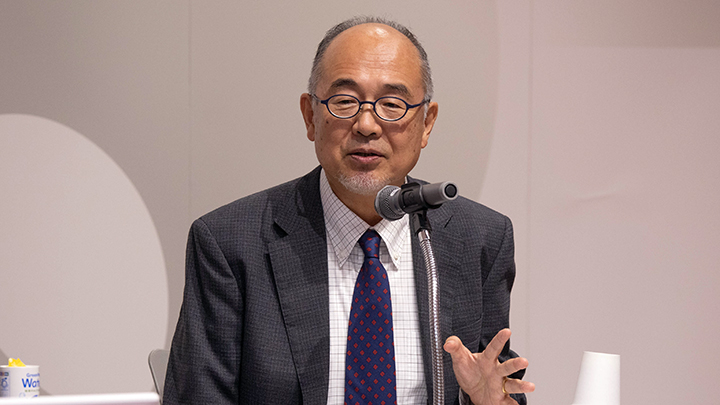
Mine Yoichi, Executive Director, JICA Ogata Research Institute, is the author of Oral History of Development Cooperation: Beyond Crises.
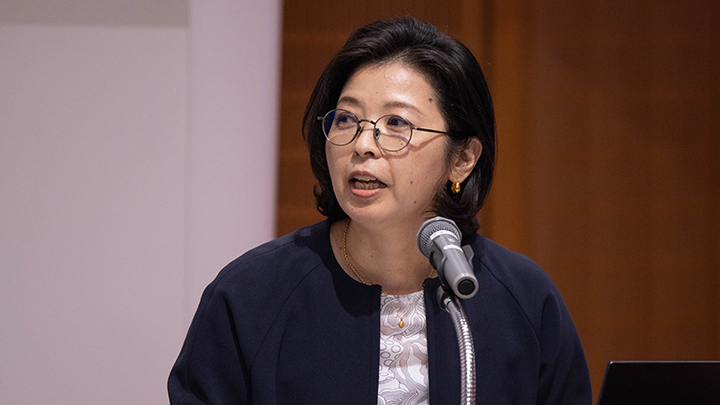
Iwama Nozomi, Senior Deputy Director General, Governance and Peacebuilding Department, JICA, discussing from the perspectives of a development cooperation practitioner
Active discussion among the panelists followed. In particular, the need to recapture development cooperation from the perspective of integrating national interest and international public interest, the need to conduct studies on global agendas and disseminate their outcomes so that a global or regional platform can be formed and led by Japan, and the need to communicate what international cooperation is and how it is a growth industry to younger generations, were pointed out.
A video recording of this event can be viewed by clicking the link below.
To learn more about the JICA Ogata Research Institute’s contribution to human security:
Highlights
To learn more about the JICA Ogata Research Institute’s research project:
Blog: “Exploring an Indicator Framework for the Post-2030 International Development Goals that will Follow the United Nations Sustainable Development Goals (SDGs)”

事業事前評価表(地球規模課題対応国際科学技術協力(SATREPS)).国際協力機構 地球環境部 . 防災第一チーム. 1.案件名.国 名: フィリピン共和国.

事業事前評価表(地球規模課題対応国際科学技術協力(SATREPS)).国際協力機構 地球環境部 . 防災第一チーム. 1.案件名.国 名: フィリピン共和国.

事業事前評価表(地球規模課題対応国際科学技術協力(SATREPS)).国際協力機構 地球環境部 . 防災第一チーム. 1.案件名.国 名: フィリピン共和国.

事業事前評価表(地球規模課題対応国際科学技術協力(SATREPS)).国際協力機構 地球環境部 . 防災第一チーム. 1.案件名.国 名: フィリピン共和国.

事業事前評価表(地球規模課題対応国際科学技術協力(SATREPS)).国際協力機構 地球環境部 . 防災第一チーム. 1.案件名.国 名: フィリピン共和国.
scroll